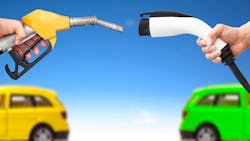The hybrid vehicle sector continues to grow. A recent report from research firm Fortune Business Insights stated that the hybrid market will grow from $157.48 billion in global sales in 2019 to $280.75 billion by 2027. That accounts for a significant increase in hybrid vehicles on the roads, and those cars will require service as they rack up miles.
With four levels of electrification: mild hybrids, full hybrids, plug-in hybrids, and electric vehicles with range extender hybrids, it is clear that each level requires an increased skill level – though it is certainly achievable to integrate hybrid and even EV services into a quick lube business.
You may already see hybrids pulling into your shop for oil changes. Yet, there are a number of additional services to offer these clients. Some services are just like those offered to combustion engines such as changing fluids while others require new skills and tools to perform.
Training and Safety are Key
The first step in the process is to find a class or other training opportunities. Designate one or more technicians and enroll them in training. There are both online and in-person programs available, including training centers that may require travel for the team, or education programs that will travel to your shop to immerse the staff in training.
About 15 years ago Eric Carlson, owner of Ervine's Auto Repair and Grand Rapids Hybrid and EV in Grand Rapids, Michigan, decided to advance his auto repair business to include hybrids. He and his wife bought a Toyota Prius – one of the early entries in the hybrid market – and enrolled in a week-long class in Massachusetts outside of Boston.
"My hope at that point was to service one (hybrids) a month," Carlson says. In the time since, business has grown to two-to-four hybrids a day, on average. "It's been very good for our business."
The training was an important first step. It should always begin with a lesson in safety, and it is important to understand that the hybrid vehicle has a high-voltage battery and requires safety equipment such as proper gloves when handling.
Safety is first and foremost in any lesson.
"Training doesn't have to be a lot," says Carlson. "It has to encompass safety. The first things they discuss are safety."
Getting this training is no different from other automotive repair and service in the results.
"Your confidence level goes up," Carlson tells NOLN. You're able to feel like 'this is something I can do.'"
One advantage to in-person classes is exposure, as you'll "rub shoulders," as Carlson puts it, with other technicians, owners, and instructors. You may learn about tools and equipment that other shops are already using, and practices that might not come up in more structured online training.
While there are many tools to be had, "You don't need a lot of that stuff," Carlson explains. "When we first got into it, I had one meter and a set of gloves. Since then, we've bought other tools."
Getting Staff On Board
While hybrid vehicles have been on the roads for a number of years, it is still a relatively new segment of vehicle repair for many shops. It will likely be necessary to train current or new employees rather than expect to find mechanics experienced with hybrids.
Carlson explains that at Ervine's, they do include phrases such as "hybrid training preferred," in job postings, however the "we will train" is typically what brings in applicants. After 15 years of experience with hybrid vehicles, Ervine's typically trains employees in house or signs workers up for virtual training sessions.
"We train mainly in house. We start them out on basic safety," Carlson details. "What we look for, where we look for it, why there's high voltage here, and why there isn't (high voltage) when we turn it off."
Ervine's has seen technicians go from no experience or training with hybrid vehicles to quickly achieving certification with ASE.
Carlson recommends that shops new to working with hybrids send one or more people to in-person training. "They have to send somebody to get their feet wet," he says.
"Once somebody becomes your resident expert, everybody will readily take to it," states Carlson.
The lead technician, who received training first and will quickly gain experience, will likely become the go to staffer when issues come up. The rest of the team can then look to this employee for help and answers. Though Carlson expects the whole team will gain valuable experience quickly.
Dealing with the Batteries
"There's plenty of money to be made in hybrid repairs," Carlson says.
Hybrid owners want to keep their cars longer.
"We're tree huggers. We like to not waste money on buying cars every few years," Carlson relates. "They'll keep them and try to get 300k miles out of them. You can't do that without repairs."
One of the major repairs that comes up is battery replacement. While there are several maintenance and repair tasks that can be performed without gloves, when dealing with the battery, those aforementioned gloves and safety precautions are essential.
The manufacturer is another important factor, as each brand may require specific batteries, tools and procedures. Once the shop has the skill to replace batteries, your team may just draw service from dealerships. Carlson says customers have called him from the waiting room of a dealership and left to get their battery replacement at Ervine's. One customer notably drove several hours – and past countless dealerships and shops – from Detroit to get his battery replaced at Carlson's shop.
"We're cheaper," Carlson explains, when it comes to competing with the dealership. The shop also has experience of putting in between 50 and 100 hybrid batteries over the years. In addition to price and experience, Ervine's customers are made to understand the shop wants to service the car, "Whereas the dealership fobbed it off on whoever complained the least."
Hybrid Services
If changing batteries with high-voltage risks and protective gloves is intimidating, the shop can still get into upselling services to hybrid owners, and even perform services with the gloves off. Some of the same service customers need for combustion engines, such as fluids and fills, filters, tire rotations and everything else an engine requires for maintenance can be taken on with little extra training.
"In my opinion it's almost more important a hybrid engine's transmission fluid is changed," Carlson offers. "The engines are electric, high heat, moisture and tiny fragments of metal can wear through insulation on the motor windings. There's no filter in there to help filter the fluid out. A drain and fill is critical to do that."
Carlson says it's easy to change fluids once you're under the hood. What is important to know, however, is that many transmissions require their own specific fluids.
"Go with whatever the original equipment manufacturer requires," he advises.
In addition to an oil change, hybrid vehicles require some of the same fluid services such as transmission and brake fluid. Coolant is important, and many hybrid models have two or three coolant systems.
"There's plenty of opportunity for maintenance that doesn't require repair work," Carlson assures.
It's a Wrap
Marketing your hybrid services is another necessity. When Carlson and his wife bought their first Prius, the family owned and run Ervine's got the car wrapped with the shop logo. The service shop acquired additional hybrid vehicles, with branding wraps, and began to offer those cars as loaners for customers whose cars were being serviced.
"We have eight loaners now. If you were to get into this, get a loaner vehicle," Carlson suggests.
Some of the hybrids the shop has acquired for loaners were from customers who opted not to replace the battery and sold the cars sometimes for just a few hundred dollars. Once the shop acquires a vehicle for a loaner, however, maintenance may be required.
"Don't give somebody a dented up loaner. Offer something you would expect a rental place to offer. Everything needs to work, there can't be any cracked glass. Your loaner vehicle needs to be clean," Carlson says. "Exude good service."
The loaner will not only go far to develop a good relationship with the customer it may increase the service with that customer.
"Loaner vehicles will garner more upsells than just about anything else you've got," Carlson finds. "You can relax and take your time with repairs and service."






